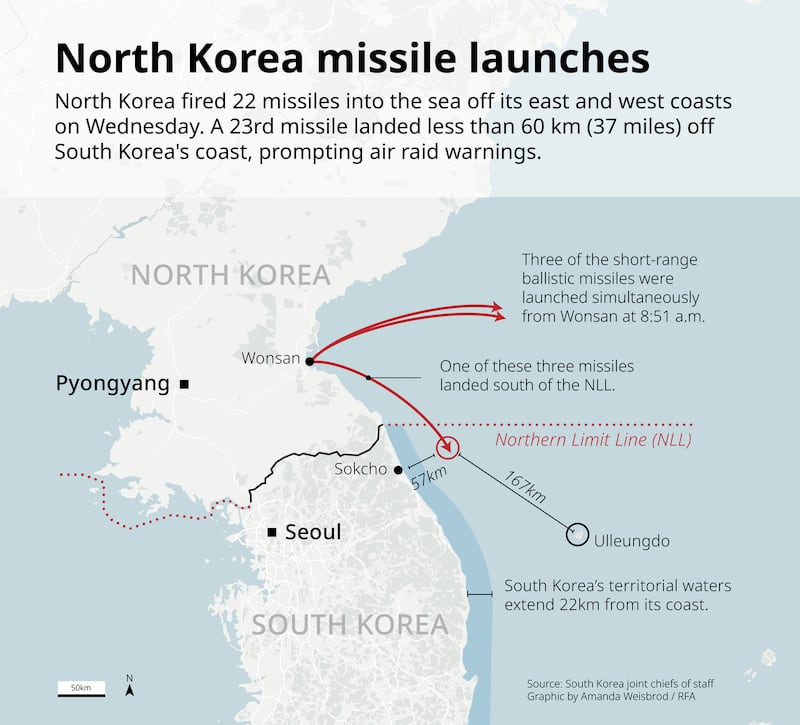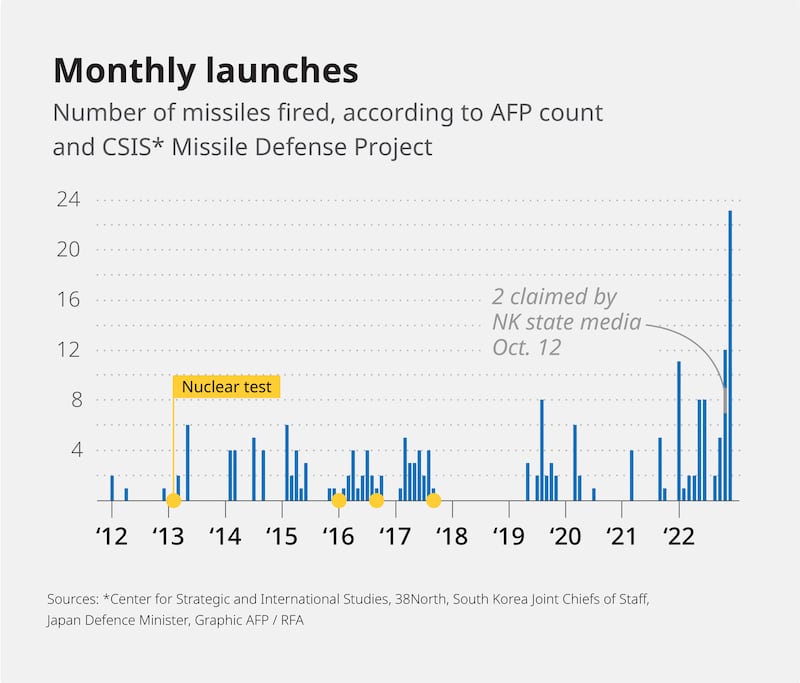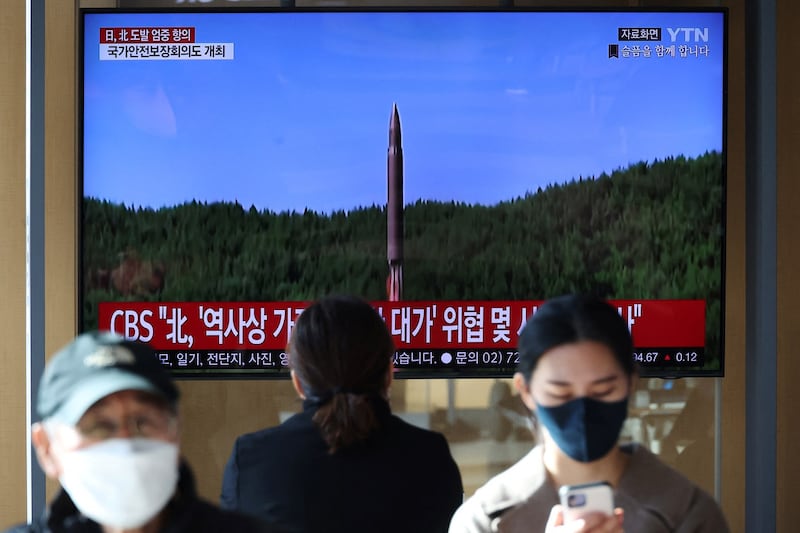UPDATED at 2:17 p.m. EDT on 11-03-2022
North Korea unleashed nearly 30 missiles over two days, ratcheting up tensions on the Korean peninsula amid growing speculation that Pyongyang may conduct its seventh nuclear test in the near future.
After launching 23 missiles on Wednesday – including one that crossed a disputed maritime border for the first time – North Korea fired six more on Thursday, including a long-range inter-continental ballistic missile, the South Korean military said.
The ICBM, believed to be a Hwasong-17, seems to have failed after second stage separation, a defense expert told South Korea’s Yonhap news agency.
The rising tensions were similar to the period before the North’s sixth nuclear test and three intercontinental ballistic missile tests in 2017, Ken Gause, of the Virginia-based CNA think tank, told Voice of America.
The barrage was North Korea’s response to Seoul and Washington’s Vigilant Storm joint military exercises after a five-year hiatus, said Gary Samore, the former White House coordinator for arms control and weapons of mass destruction. The drills began on Monday.
“It's a warning,” said Samore.
“It demonstrates that North Korea has the ability to launch multiple ballistic missiles at targets in South Korea and the region to deter the U.S. and the R.O.K. from attacking North Korea, even though [they] have no intent of attacking,” he said, using the abbreviation for South Korea’s official name, the Republic of Korea.
The Vigilant Storm exercises were supposed to end on Friday, but South Korea’s military announced that Seoul and Washington agreed to extend them in response to the North’s provocations.

“Dangerous and false choice”
The North’s state-run Korea Central News Agency made no mention of the missile launches but quoted Pak Jong Chon, secretary of the Central Committee of North Korea’s ruling Workers’ Party, who called the extension “a very dangerous and false choice.”
“The irresponsible decision of the U.S. and South Korea is shoving the present situation caused by provocative military acts of the allied forces to an uncontrollable phase,” he said. “The U.S. and South Korea will get to know what an irrevocable and awful mistake they made.”
Adding to tensions, one of the 23 missiles launched on Wednesday – the most in a single day – crossed a disputed maritime border and became the first North Korean fired missile to land near South Korean territory since the 1950-53 Korean War.
It flew south of the Northern Limit Line and splashed down more than 100 miles (160 km) away from the South’s eastern island of Ulleungdo.
Experts said the escalation in tensions could culminate in a seventh nuclear test.
Such a test is possible, especially if North Korea fails to get what it wants after milder provocations, Gause told RFA.
“They already sent things over to the NLL, and over Japan, they are running out of things to do that move up the escalation ladder,” he said.
With the U.S. and South Korea cooperating for joint military exercises, there is no reason to believe North Korea will stop missile testing, Frank Aum, the U.S. Institute of Peace’s senior expert on northeast Asia, told RFA.
“North Korea has completed preparations for another nuclear test so it is possible that it could happen soon,” he said.
“The two countries need to move away from mutual saber-rattling and start taking measures to reduce tensions.”
The seventh nuclear test could come before the U.S. midterm elections on Nov. 8, the Wilson Center’s Sue Mi Terry said Thursday at a Seminar hosted by the Center for Strategic International Studies.
I thought they might take a pause because of the Itaewon tragedy but of course they are not. They are careless. They are not going to do that,” she said, referring to the tragic loss of more than 150 lives over the weekend caused by overcrowding during Halloween celebrations in Seoul’s Itaewon neighborhood.
She said Pyongyang faces little if any repercussions for its provocations, so there is nothing preventing a seventh nuclear test.
“For me, the North Korea calculation remains the same. Why not? Get to it. Do the test. Learn from it. Get to the next level so they do have leverages.”

ICBM
The ICBM launched Thursday morning Korea time traveled about 760 kilometers (472 miles) from its origin point in Pyongyang’s Sunan area, the South Korean Joint Chiefs of Staff said in a statement.
"Our military's response reaffirms our resolve to sternly respond to any provocations (by North Korea) and shows that we are capable of accurately striking our enemy," the JCS said.
Though North Korea launched its most missiles ever in a single day on Wednesday, the barrage was “not very impressive,” said Bruce Bennett of the California-based RAND Corporation.
“It took the North 10 hours to launch 23 missiles; the last of the launches took 40 minutes to fire just 6 missiles,” said Bennett.
“If that is the best North Korea can do in terms of synchronizing missile launches, then the North Korean threat is not very intimidating,” he said.
Bennett said that in a serious attack, Pyongyang would need to launch “many dozens” of missiles within minutes of each other to avoid swift retaliation from the South that would destroy unfired missiles and launchers.
“Thus far, the North is well short of demonstrating that kind of capability,” he said.
But despite Pyongyang’s attempts to project strength through the missile launches, it may actually be a sign of desperation, David Maxwell of the Washington-based Foundation for Defense of Democracies, told RFA.
“This may be a sign of desperation because [leader] Kim [Jong Un’s] political warfare and blackmail diplomacy strategies have failed to achieve Kim's desired effects. South Korea and the United States refuse to appease him,” said Maxwell.
He urged Washington and Seoul not to give in to Kim’s demands.
“Now is the time to increase pressure on Pyongyang with a comprehensive information and influence campaign to force three choices on Kim: change his behavior, have the elite and military leadership force a change, or the Korean people will cause change,” Maxwell said.

More provocations from North Korea are likely to follow in the coming days, Ellen Kim, deputy director of the Korea Chair at the Washington-based Center for Stratigic and International Studies, said in a statement.
"CSIS data shows that North Korea responds belligerently to U.S.-ROK military exercises when there is no ongoing diplomacy taking place among the parties concerned," she said.
South Korea’s Foreign Ministry said in a news release that Foreign Affairs Minister Jin Park and U.S. Secretary of State Antony Blinken denounced North Korea’s launches during a phone call.
Chinese Foreign Ministry spokesperson Zhao Lijian told reporters that Beijing was closely following the situation.
“It is in the common interest of the region to maintain peace and stability in the peninsula, and resolve each other's concerns in a balanced manner through dialogue and consultation,” he said, adding that China hopes all concerned parties would work toward a “political settlement” and prevent a “spiral of escalation of the situation.”
RFA's Korean Service contributed to this report.
UPDATE: Adds information about additional three missiles fired on Thursday evening and discussion over possible 7th nuclear test.
